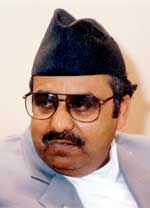 There are ten reasons the talks failed:
There are ten reasons the talks failed: 1. We still don't know what was agreed in the first round of talks in November 2001, who had agreed to what and whether these agreements were fulfilled.
2. There was no sense of urgency or seriousness about setting up a Code of Conduct monitoring committee.
3. We still don't know why or on whose instructions the army reneged on the agreement on the five km limit.
4. His Majesty added two more facilitators to Padma Ratnaji and myself, which no one was comfortable with. From my point of view, our role was limited and made ineffective.
5. The Maoist side repeatedly raised the issue of direct talks with the king, rather than with a government with or without executive powers. But there wasn't even a public response to this.
6. The Thapa government's negotiating team in Nepalganj was not just a formality, but its concept paper did not give the Maoists the concessions to stay on in talks. They warned about this repeatedly.
7. While the talks were going on in Hapure, the Maoists alleged in a letter that the army executed their political workers deliberately in order to sabotage the talks. The Maoist leadership then decided there was no point continuing with bargaining over constituent assembly.
8. Aside from the proposal from us facilitators on 17 August about widening our role, we were reduced to being spectators in the talks. After the deadlock on 19 August, we proposed that both sides take time to re-evaluate their positions.
9. But both sides went home and raised the level of their rhetoric. The government side was rigid on the constituent assembly demand in a situation of militarisation. And both sides started blatantly breaking the ceasefire and the assassination campaign began.
10. Those who should have helped protect the ceasefire didn't, and tried their best to make our jobs difficult. The same people are now shedding crocodile tears. With foreigners now calling the shots, I don't know whether talks will ever succeed. But this much I can say: for the peace process to succeed you need a government and state party that is serious about negotiations and one that can muster the national consensus for it. I realised this time what a big difference there is between negotiations held while parliament is in session and while it is not.


